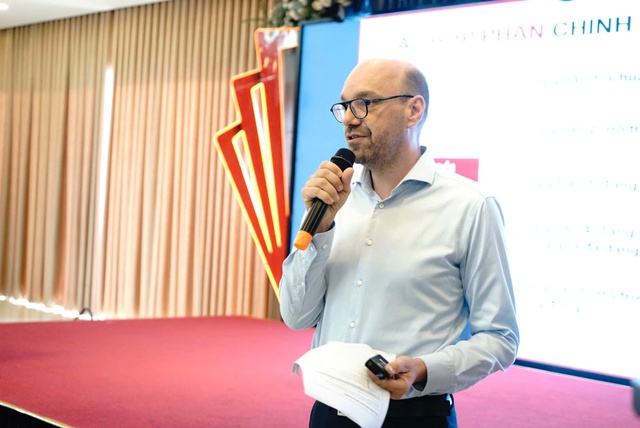
Germany supports Vietnam in sustainable cocoa production, farmer resilience
The German government has helped Vietnam’s Central Highlands region boost sustainable cocoa production and strengthen the adaptive capacity of small-scale cocoa farmers regarding climate change through a four-year project.
The ‘Regenerative Cocoa Production to Support Livelihood Development in Vietnam’ (ReCoPro) project, co-funded by the German government and Puratos Grand-Place Vietnam (PGPV), is implemented by the Deutsche Gesellschaft für Internationale Zusammenarbeit (GIZ), in cooperation with PGPV, from November 2021 to November 2025 in Dak Lak and Lam Dong Provinces.
A closing workshop of the project was held in Dak Lak Province on Wednesday, bringing together more than 50 participants from government agencies, international organisations, the private sector, and farmer cooperatives.
They reviewed key achievements, shared lessons, and discussed the future of sustainable cocoa development in Vietnam.
The project promoted regenerative farming and agroforestry in cocoa plantations by supporting farmers in planting forest and fruit trees alongside cocoa.
Shifting away from monoculture, these plants provide essential shade for the shade-loving cocoa, while raising income and increasing their resilience against climate change impacts.
In the past, farmers were often unfamiliar with forest trees and tended to clear them to grow fruit trees.
However, through training and field demonstrations, they now recognize that under a changing climate, forest trees play a vital role in improving soil health, maintaining shade for cocoa, increasing biodiversity and ensuring the long-term sustainability of their farms.
“This project is a strong example that resilient and climate friendly cocoa farming can increase productivity and income for farmers, while contributing to the climate agenda,” said Daniel Herrmann, head of Climate Policy at GIZ Vietnam.
The project provided almost 90,000 seedlings to 300 farmers based on experts’ review of farms’ condition, followed by technical advice and monitoring.
In addition, 88 training sessions and field demonstrations were held for more than 2,000 participants, helping farmers adopt regenerative agricultural practices, farm management and business development.
Techniques introduced by the project have proven technically and economically beneficial.
For instance, a drip irrigation system helps farmers reduce water use by up to 30 percent, while optimizing fertiliser efficiency through fertigation, and significantly reducing labor requirements for both irrigation and fertilisation.
Also, farmers were trained to use agriculture residues such as cocoa husks, leaves, and other organic by-products to produce compost, thereby improving soil fertility and reducing input costs.
These regenerative practices help cocoa trees grow better under changing climate conditions and contribute to sustainable farming and environmental protection.
Through the project, eight demonstration farms were established in Dak Lak and Lam Dong Provinces, delivering measurable improvements in productivity, cocoa quality, and environmental outcomes.

Daniel Herrmann, head of Climate Policy at GIZ Vietnam, speaks at a closing conference of the ‘Regenerative Cocoa Production to Support Livelihood Development in Vietnam’ project, held in Dak Lak Province, October 22, 2025. Photo: ReCoPro
Beyond farming practices, the project has strengthened farmers’ business skills.
While cooperatives received support in marketing, e-commerce, and branding, farmers learned to promote their products on digital platforms, improve packaging to meet market demands, and build stronger cooperative brands.
This combination of technical and business support has enhanced market access and increased farmers’ confidence and income stability.
The project has encouraged women to participate in training and cultivation activities, contributing to both household income and community development.
Representatives from the Nhat Tam Cooperative, a local organization supported by the project, shared that women’s active participation has led to improved household livelihoods and stronger leadership.
Furthermore, the project explored initial elements of a community carbon financing scheme to compensate farmers for efforts to reduce greenhouse gas emissions.
Under this initiative, farmers received incentive payments of around VND3,000 - VND4,000 (US$0.11-$0.15) per living tree at the first and second monitoring phases.
“Apart from productivity, we also equip farmers with knowledge, improve traceability, and establish the foundation for deforestation-free cocoa production,” said Justin Jacquat, regional cocoa manager at Asia-Pacific Puratos Grand Place.
The ReCoPro project represents a major milestone in sustainable cocoa production, demonstrates how collaboration along the supply chain can deliver long-term economic, social, and environmental benefits, and showcases how regenerative practices and inclusive business models can build a resilient and competitive cocoa sector in Vietnam.
Through its focus on climate-smart agriculture and community empowerment, the project has laid the foundation for a sustainable cocoa value chain that benefits both people and the planet.
Tieu Bac / Tuoi Tre News
Link nội dung: https://news.tuoitre.vn/germany-supports-vietnam-in-sustainable-cocoa-production-farmer-resilience-103251023152208655.htm